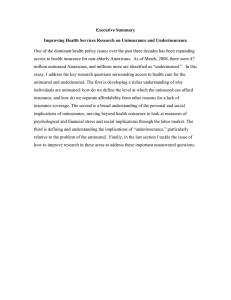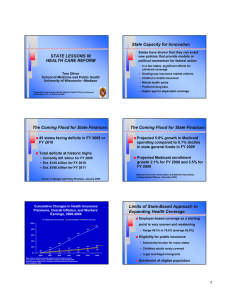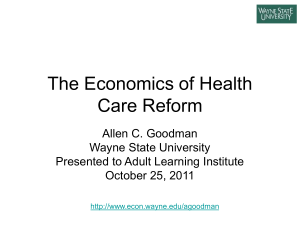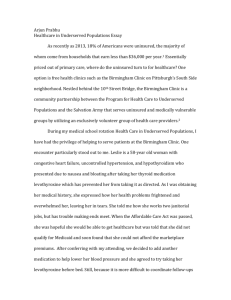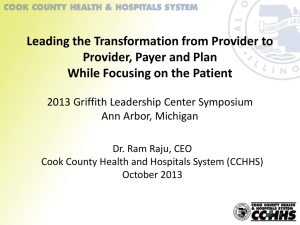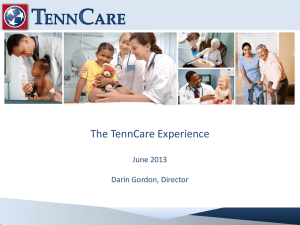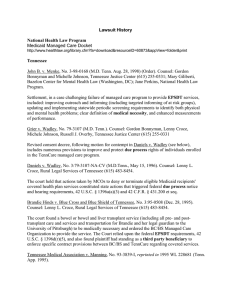First National Health Policy Conference February 1, 2001 John F. Tighe
advertisement
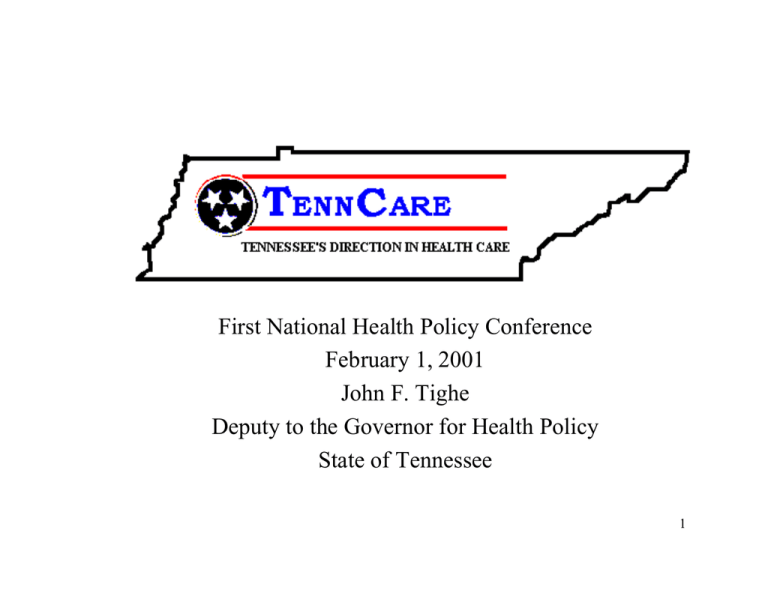
First National Health Policy Conference February 1, 2001 John F. Tighe Deputy to the Governor for Health Policy State of Tennessee 1 TennCare • A managed care program created in 1994 for poor and uninsured Tennesseans under an 1115 waiver • expanded the Medicaid Program to uninsured and uninsurable adults and children • totals $5.2 billion for FY 2001 Managed & Behavioral care program $3.7 billion Other (MH/MR/LTC) $1.5 billion 2 Features of TennCare • Managed through HMOs • Carve-outs Behavioral (BHO) Long-term Care (state) Medicare cost sharing/pharmacy (state) • Current Challenges Largest HMO in exigency Second largest in supervision Third largest in rehabilitation 3 Business Model • • • • • Actuarially based funding Twenty rate cells Risk and utilization adjusted 85% Medical loss ratio Three profit/loss risk band options – Full risk – Shared at break-even – 2% corridor with risk beyond 4 Who does TennCare Serve? TennCare Population (as of October 2000 - 1,356,124) 800,000 600,000 400,000 200,000 0 Medicaid Medicaid Duals Uninsured Uninsurable Totals Medicaid Uninsured/Uninsurable 637,071 165,514 409,830 143,709 802,585 553,539 6 TennCare Population (as of October 2000 - 1,356,124) Children Adults 500,000 500,000 400,000 400,000 300,000 300,000 200,000 200,000 100,000 100,000 0 0 Medicaid Uninsured Uninsurable Totals 350,484 196,858 6,092 553,434 Medicaid Uninsured Uninsurable Totals 452,101 212,972 137,617 802,690 7 TennCare Uninsured/Uninsurable Population by Poverty Level Children Adults 300,000 300,000 200,000 200,000 100,000 100,000 0 0 Below 100% 101% to 199% Over 200% Totals 152,326 47,486 3,138 202,950 Below 100% 101% to 199% Over 200% Totals 240,443 89,855 20,291 350,589 8 What does it cost? Annual Costs per Enrollee Children Adults Medicaid $1395.63 $3358.04 Medicaid Duals $0 $1504.16 Uninsured $957.55 $2126.28 Uninsurable $1847.27 $4087.62 10 Funding for MCO Payments (Uninsured and Uninsurable Adults) State (Gen. Fund) State (Prem. Tax) Federal Other Total $137,962,273 $17,106,164 $663,549,802 $36,689,939 $855,308,178 Uninsured (per enrollee) $367.12 $42.53 $1,651.21 $65.42 $2,126.28 Uninsurable (per enrollee) $610.39 $81.75 $3,167.86 $227.62 $4,087.62 Total U//U Adults Based on May 2000 Enrollment Data 11 Current Challenges Challenges • Enrollment Growth • Costs – Drug costs and overall medical inflation – Public commitment • Access – Dental – Provider commitment, especially specialty physicians • Members – Smooth member transition – Lawsuits / consent decrees – Due process and appeals 13 Challenges (cont.) • Commercial HMOs not participating – Prudential out in 1999 – Blue Cross out in 2000 – United dropped out of procurement • TennCare: the whipping boy for all of state’s problems • Program integrity • Slow/indecisive HCFA 14 Accomplishments What has Tennessee accomplished through TennCare? • • • • • • Increased access to health care Decreased number of uninsured Tennesseans Increased primary care and preventive services Decreased inappropriate use of ER services Decreased inpatient admissions and days Improved health outcomes 16 AND we have achieved these benefits for: • • • • • 1 in 2.4 Tennessee children 1 in 5.4 Tennessee adults Tennesseans living in poverty The working poor Tennesseans with pre-existing medical conditions 17 Conclusions •TennCare is a Good Deal for Tennesseans •But, we need Federal Commitment 18 TennCare is a Good Deal for Tennesseans • For approximately 18% of the cost (or $367/year for an uninsured and $610/year for an uninsurable) we are providing needed health care insurance to approximately 350,000 adult Tennesseans who lack insurance. • Tennessee has a health care insurance program for uninsured/uninsurable adults with a better Federal match than even a CHIP program. 19 TennCare is a Good Deal for Tennesseans (cont.) • Tennessee’s economy benefits from an additional $663 million in Federal funds. This benefit would be lost to local communities if TennCare’s uninsured and uninsurable enrollees were eliminated from the program. • Despite the many challenges, Tennessee has achieved significant improvements in health outcomes and access to preventive care. 20 But We Need Federal Commitment Themes: • Greater state flexibility • Better coordination among discrete programs • Significantly improved communication between HCFA and the states Specifically: • Stop raising the requirements for managed care programs • Simplify the waiver review process 21 But We Need Federal Commitment (cont.) • Help us maintain the fiscal integrity of the current programs – Cost sharing – Use of excess S-CHIP funds to enhance services – Flexibility in containing drug costs • Get away from the “All or Nothing” approach – Benefit package design – Quickly change benefits and limit enrollment – Targeted HCBS 22 But We Need Federal Commitment (cont.) • Encourage cooperation and coordination with the private sector by giving states: – Freedom to set reasonable cost-sharing – Freedom to use Medicaid funds to pay for part of the employee share of premiums – Tiered co-pays/co-insurance for pharmaceuticals similar to the private sector 23 For Additional Information: www.state.tn.us/tenncare/ 24
